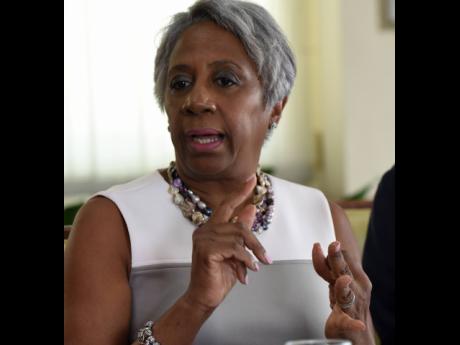Editors' Forum | Uptown silence … Affluent communities have ‘false sense of security’, not sharing info with Crime Stop
The implementation of zones of special operations (ZOSOs) in some hard-pressed communities has caused an uptick in the number of calls to Crime Stop’s ‘311’ hotline.
However, there are concerns that residents of more affluent areas continue to keep quiet about crimes in their space.
These persons, according to representatives of Crime Stop Jamaica (CSJ), are victims of a “false sense of security” – mistakenly thinking they are safe behind high-tech security systems and the confines of their locked homes or gated communities.
“Even though people like to say that persons from the inner city are afraid to call or whatever, that is where we get most of our information from. We get little or zero information from upper St Andrew or St James, or wherever,” explained Sandra Glasgow, chairperson of CSJ.
“It is like, because they are living in this so-called safe community, they think that nothing can happen to them. I know people who have said ‘I’m sure the person living next to me is a drug runner’, and I ask ‘so what are you doing about it?’, and they say ‘nothing’.”
Spurning the chilling silence from some residents’ ‘cocoons’, director of the CSJ programme, Brian Schmidt, argues that, “Unless somebody is directly affected by a crime, it is somebody else’s issue. But the instant it becomes their issue, then they understand the value.”
The sentiments were expressed in a Gleaner Editors’ Forum last Thursday, where Schmidt said the ‘informer-fi-dead’ culture continues to thrive across Jamaica – not just in the inner-city communities – and that CSJ has been exploring various means to collect information.
HIDING FROM THE POLICE
England-based dancehall entertainer Jason McDermott, also called Stylo G, was last Monday detained by cops who turned up and searched premises in which he was staying inside the upscale Caymanas Estate residence in St Catherine. The police were reportedly called by residents of the community.
According to the residents and management of Caymanas Estate, the incident was the culmination of a slew of concerns regarding unscrupulous persons who were renting properties and disobeying general rules – including noise abatement and security access.
Their anxiety was reflected in a report published by the Jamaica Constabulary Force’s National Intelligence Bureau (NIB), which, two weeks ago, confirmed that criminal gangsters were hiding from the police in gated communities in the Corporate Area and St Catherine.
“This is mainly because whenever persons want to enter these communities, permission must be granted by the resident they wish to visit,” stated the 2018 National Gang Assessment by the NIB, which also noted that organised gangsters continued to employ drones, explosives, migration, and threatening witnesses to avoid sleuths.
On Thursday, Assistant Police Commissioner McArthur Sutherland, head of the Criminal Investigation Branch, told The Sunday Gleaner that information about criminal suspects hiding out in high-priced communities is a phenomenon that his team has been probing.
“But remember, criminal suspects move around. They assess their situation and they move around to ensure that they evade capture. Sometimes they will be somewhere where the next-door neighbour does not even know who they are. That’s the reality,” he said.


